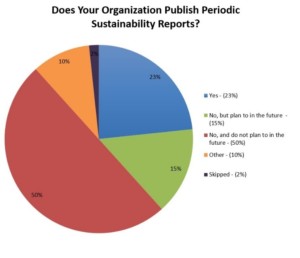This website uses cookies so that we can provide you with the best user experience possible. Cookie information is stored in your browser and performs functions such as recognising you when you return to our website and helping our team to understand which sections of the website you find most interesting and useful.
News
Four Takeaways from the Vinyl360 Annual Meeting
This year’s Vinyl360 annual meeting focused on the vinyl industry’s sustainability initiative and the steps that members across the vinyl value chain are taking to embed sustainability into their operations and their brands. It’s a work in progress—and progress is being made.
Here are top takeaways on our sustainability journey to date.
1. Just 23% of companies currently publish sustainability reports.
 A survey of vinyl companies from compounders to end-product manufacturers found that only about a quarter of companies publish sustainability reports. A Sustainable Solutions Corporation benchmarking survey also found that 50% currently have no plans to do so.
A survey of vinyl companies from compounders to end-product manufacturers found that only about a quarter of companies publish sustainability reports. A Sustainable Solutions Corporation benchmarking survey also found that 50% currently have no plans to do so.
The VSC is preparing to release the first industry-wide report. The aim is to report on the industry’s sustainability efforts to date and to lay out benchmarks and next steps. The VSC is also hoping that the report will give companies across the supply chain a model for thinking about their activities—and reporting on their corporate initiatives.
2. Vinyl recycling is a priority for most companies.
According to the same Sustainable Solutions survey, a majority of companies (55%) across the vinyl value chain are engaging in recycling activities—and even more are interested in opportunities to do so.
The survey also identified several barriers to increasing end-of-life recycling, including contamination, legacy additives, and the absence of an end market for recycled material.
Rick Wagner, Sustainability Policy & Program Manager for Chevron Phillips and Chairman of American Chemistry Council’s (ACC) Plastics Recycling and Recovery Team, told Vinyl360 participants that “it’s important to look at plastics in a circular economy. It is doable,” he said, “with the proper infrastructure in place.”
Wagner discussed the ACC’s sustainability goals (100% of plastics packaging reused, recycled, or recovered by 2040) as well as the role that vinyl can play in recycling. He advised participants:
- to consider best practices for sorting (how to recycle efficiently),
- to identify vendors looking for specific components and ingredients (where’s the market?),
- and to identify infrastructure needs (what investments will boost vinyl recycling?) .
“You have to create the market for the recycler to have a profitable business,” Wagner said.
Also at Vinyl360, the VSC recognized leading companies for their sustainability efforts, including Vinyl Recycler of the Year.
3. Health and safety is everyone’s job.
During a panel discussion on health and safety best practices, Kenny Akins, Director of Corporate Environmental and Sustainability, Westlake Chemical, said that “your safety program is only as good as your employees think it is.” He stressed that all employees must buy into safety efforts. Mary Bachynsky, Director of Environmental, Health, and Safety, Formosa Plastics, added that her company has health and safety advocates in each unit.
Akins and Bachynsky were joined on the panel by David Adenuga, Oxo Americas Regulatory Affairs Advisor, ExxonMobil, and Chris Krishna, Director of Environmental, Occidental Chemical Corporation. Krishna added that it was also important to explain to employees the why. “Understanding why we’re doing something is essential to making them support it,” he said. Krishna also advised bringing people into teams to solve a problem as “that can get you to better solutions—and employee buy-in.”
The vinyl industry has a longstanding commitment to the health and safety of workers. At Vinyl360, 28 facilities received 48 awards for outstanding performance in the areas of safety excellence, safety performance, environmental excellence, and environmental honor.
4. There’s work to do on tracking emissions.
The Sustainable Solutions survey asked companies whether they track various emissions over and above state and federal emissions requirements. A total of 42% of respondents track Scope 1 emissions; 22% track Scope 2 emissions; and just 44% track Scope 3 emissions. In addition, 44% of respondents track non-hazardous waste.
Domenic DeCaria, VI’s Technical Director, said that the VSC is hoping to see a boost in overall industry reporting of emissions to air and water to at least 50%.
Finally, Ramesh Iyer, Global Sustainability Director, Coatings, Monomers, and Plastics Additives, Dow Chemical Company, discussed his company’s focus on the circular economy. He stressed that there must be a corporate-level blueprint for sustainability. Iyer also stressed that sustainability isn’t something any one company can do alone. “You need to engage employees, partners, and customers,” he said.


